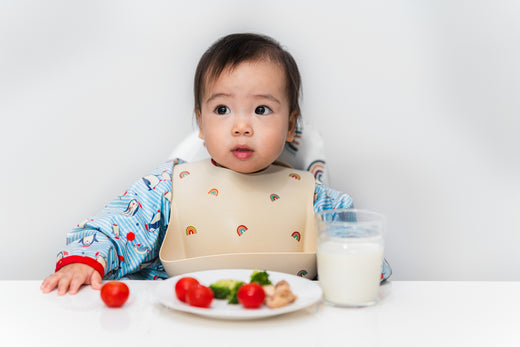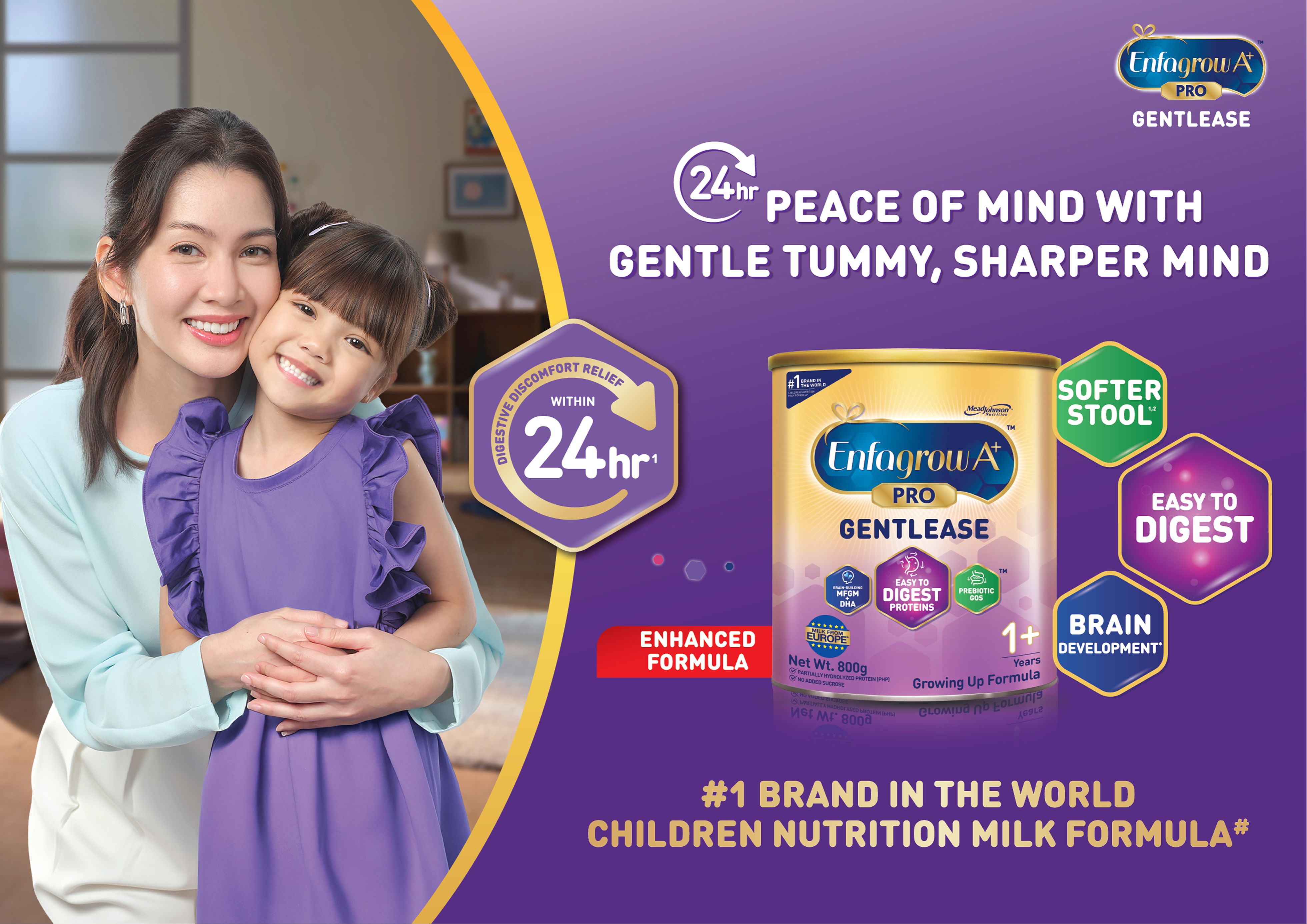
The transition from milk to solid baby food is a huge milestone! And for parents, it becomes an exciting endeavour, introducing new textures and flavours to your little one. But, while you may want to feed them all your favourite food, remember that your baby’s palate and digestive system can quickly become overwhelmed. So, take it slow and consider the following tips.
In this article, we discuss the following important topics:
- Is your child ready to try solid food?
- Preparing your baby’s first food
- Baby food Singapore: Meal options
-
Do’s and Don’ts

Mothers typically can introduce solid foods to their child’s diet at around six months.1 The introduction of complementary foods should occur around six months, but not earlier than four months, as an earlier introduction may increase the risk of food allergies and excessive weight gain. Between four and six months, complementary foods can be given when the child demonstrates developmental readiness, e.g., the ability to hold their head up steadily, the disappearance of the tongue thrust reflex, showing interest in food, and frequently putting things into their mouth.* This transition into solids is a big one as it involves progress in the baby’s nourishment and their overall development. Let’s take a closer look at what else goes into your baby’s first food.
Baby's first food, also called “complementary” food, 2 is meant to complement milk feeds and not replace them. Before planning your baby’s first food, you should ensure they are ready by considering the following:3
- Make sure the baby can hold their head up
- Make sure the baby can sit upright with support
- Able to open their mouth when food approaches
- Has lost the tongue-thrust reflex that pushes the spoon back out of the mouth
- Can somewhat draw in food from a spoon into the mouth
How to Prepare Your Baby’s First Food?4
The baby’s first food is essential for proper growth and development, especially in the first three years. When it comes to starting baby on solids, parents may first introduce single-ingredient foods with no added sugar or salt and foods rich in iron and zinc, particularly, those found in pureed meats and single-grain cereals. Iron is an important nutrient during the period of complementary feeding, as iron stores in children decrease around this period. There is b evidence that iron-rich foods during complementary feeding, e.g., dark green vegetables, iron-fortified baby cereals, meats, and legumes, help maintain adequate iron status and prevent deficiency in the first year among children at risk of insufficient iron stores or low intake.*
As per tradition, single-grain cereals are the baby's first solids. However, no medical evidence shows that introducing solid foods in any particular order is advantageous for your baby. When feeding the baby's first food, pureed fruits, vegetables, and meats are nutritious options. It is also essential to increase the texture and consistency according to how the baby progresses. Introduction of textures should occur gradually around 7-8 months, an important window for the development of oral skills and facial muscles, and no later than 10 months of age.*
What foods to introduce first? When the baby gets older (around 8 to 10 months), try feeding your baby with finely chopped foods like:
- Pasta
- Soft fruits
- Veggies
- Cheese
- Well-cooked meat
- Dry cereal
- Baby crackers
Baby's First Food: Meal Options
Rice Cereal
Rice cereal is one of the top options for the baby’s first food as it is easily digestible and well-tolerated by first-time solid food eaters.
Adding other single-grain variants to the baby’s solid diet is good, like quinoa, barley, and oats5 and the brown rice variant. Don’t put your children on a gluten-free diet (even if the parents are on one) unless prescribed by a doctor.6 Choosing iron-fortified cereals is essential, as babies need iron to deliver oxygen to the brain and the body parts. Children lacking iron are prone to slow weight gain, pale skin, irritability, and loss of appetite7.
Pureed Fruits and Vegetables
Vegetables and fruit puree are staples in baby's first food and they are versatile and easily made. Parents can make purees of sweet potatoes, carrots, peas, potatoes and pumpkin8. Practically one can puree all foods. Green beans, spinach, and fruits such as bananas, pears, plums, blueberries, avocados, and peaches can all be minced to creamy, healthy fare to suit your little one’s palate and tummy. You can steam, boil, or bake these veggies before mashing or whipping them to the appropriate consistency.
Fruits and vegetables are a great source of many vitamins, minerals, and fibre8. Fruits pack antioxidants and fibre, strengthening the immune system and fostering healthy digestion9.
Baby’s First Food: Do's and Don'ts
Do’s:
In planning your baby’s first food, one of the more critical baby-feeding do’s includes following the three-day rule, which involves feeding your baby only one type of food over that period to ensure they are not allergic, and to give their digestive system time to adapt12.
Be sure to also speak to your paediatrician about the risk of food allergies, although studies show that introducing allergenic food to the child―peanuts, eggs and fish, among others―may reduce the risk of developing that allergy4. However, for babies with a family tree or a history of food allergies or eczema, introduction to certain solid foods could be delayed to avoid triggering a severe allergic reaction13. It would be best to consult a specialist while planning your baby’s first food should there be any concerns or questions about introducing allergenic foods to babies in this situation.
Don’ts – Food to avoid in babies:
-
Sugar and sugary foods
They are to be avoided before the age of one as they not only encourage the development of a sweet tooth but can also promote tooth decay. Instead of fruit juices, children should prioritise nutrient-dense foods and beverages, as juices can lead to premature satiety, potentially hindering the consumption of more nourishing options like milk.
Although current evidence appears to have mixed outcomes, there seems to be a positive correlation between juice intake (including 100% fruit juice) in the first year of life and higher BMI z-scores. Thus, we additionally recommend the exclusion of all juices, including those without added sugar, before two years due to their high sugar content, potentially leading to a taste preference for sweet drinks and foods.* -
Consider including whole fruit in planning your baby’s first food, as it contains fibre and can help promote healthy digestion.11
-
Honey
Avoid honey till the age of 1 year as it may contain spores that cause infant botulism, a gastrointestinal disease due to Clostridium botulinum bacteria10. -
Salt
It's advisable to avoid introducing salt to a child's diet before they reach the age of one year. This precaution is because their kidneys are not fully mature, and excessive salt intake can burden their developing renal system. Moreover, introducing salt too early may hinder their ability to appreciate the natural flavours of foods without added salt. Over time, this could lead to a preference for salty foods, potentially contributing to unhealthy eating habits as they grow older.
Keeping all of these things in mind, you are well on your way to putting into practice your baby’s first food in Singapore. Good luck, mommy!
Is your baby ready for solid food? Check out articles and more advice from the experts. Be part of the Enfamama A+ Club today to unlock a world of privileges and benefits which include free samples, exclusive vouchers, promotions, and much more!
Frequently Asked Questions on Baby’s First Food
It can get confusing and overwhelming, worrying about what to feed your baby as they transition from milk. Learn more important information about baby’s first food here!
What are the most common food allergies in children?14
As you introduce new food, it’s essential to take note of your baby’s responses, to see if they trigger allergic reactions. It’s best to bring these foods into your baby’s diet gradually and in small quantities so you can check for tolerance.
Here are the most common types that may trigger food allergies.
- Eggs
- Nuts
- Seeds
- Shellfish
- Dairy
- Fish
How much soft food should babies eat?15
You can start feeding your baby around two to three spoons of soft food twice a day, at six months. When they’re 6 to 8 months old, you may serve half a cup 2-3 times a day and add a healthy snack. Between months 9 and 11, increase the frequency to half a cup, 3-4 times daily with healthy snacks.
What is baby-led weaning first food?
Baby-led weaning is one approach used to introduce solid foods to babies. While some parents spoon-feed their child mashed or pureed foods, others let their babies feed themselves with finger foods. This method, known as baby-led weaning, allows babies to explore and experience different textures and tastes at their own pace.
Parents may choose how to teach their children to eat, but what is essential is that their child can consume a variety of food and get the nutrition their body needs. Always consult your doctor.
* Singapore Guidelines for Feeding and Eating in Infants and Young Children 2024.
Expert Resource:
Dr. Veena Angle
MBBS, MD (Medical Doctor)
CMPP (Certified Medical Publication Professional), Singapore
References:
- Breastfeeding, https://www.healthychildren.org/English/ages-stages/baby/breastfeeding/Pages/default.aspx, Accessed 8 Aug 2020.
- Foods and Drinks for 6 to 24 Month Olds, https://www.cdc.gov/nutrition/InfantandToddlerNutrition/foods-and-drinks/index.html, Accessed 8 Aug 2020.
- Starting Solid Foods, https://www.healthychildren.org/English/ages-stages/baby/feeding-nutrition/Pages/Starting-Solid-Foods.aspx, Accessed 8 Aug 2020.
- Solid foods: How to get your baby started, https://www.mayoclinic.org/healthy-lifestyle/infant-and-toddler-health/in-depth/healthy-baby/art-20046200, Accessed 8 Aug 2020.
- Baby Food for Thought: How Safe is Rice Cereal?, https://www.urmc.rochester.edu/news/publications/health-matters/baby-food-for-thought-how-safe-is-rice-cereal, Accessed 8 Aug 2020.
- 3 reasons your child shouldn’t go “gluten-free” (unless your doctor says so), https://www.health.harvard.edu/blog/3-reasons-not-put-child-gluten-free-diet-unless-doctor-says-201606079760, Accessed 8 Aug 2020.
- Iron needs of babies and children, https://www.ncbi.nlm.nih.gov/pmc/articles/PMC2528681/, Accessed 8 Aug 2020.
- 5 Best Vegetable Puree for Babies: Recipes and Tips, https://parenting.firstcry.com/articles/best-5-homemade-vegetable-puree-for-baby/, Accessed 8 Aug 2020.
- Food for Children: Why Fruits and Vegetables are Important, https://www.healthxchange.sg/children/food-nutrition/food-children-fruits-vegetables-important, Accessed 8 Aug 2020.
- Why Should Babies Not Have Honey?, https://kidshealth.org/en/parents/honey-botulism.html#:~:text=Babies%20younger%20than%201%20year%2cdecreased%20muscle%20tone%20%28floppiness%29., Accessed 18 April 2024.
- Should I Give My Child Juice? Here’s What Experts Say, https://time.com/5669503/is-juice-bad-for-you/, Accessed 22 Sept 2020.
- Feeding Your Baby Solid Food: Baby's First Food Journey https://www.healthhub.sg/live-healthy/babys_first_food_journey, Accessed 18 April 2024.
- Introducing highly allergenic foods to infants and children, https://www.uptodate.com/contents/introducing-highly-allergenic-foods-to-infants-and-children, Accessed 13 Oct 2020.
- What to feed your baby, https://www.nhs.uk/start-for-life/baby/weaning/what-to-feed-your-baby/from-around-6-months/#allergies, Accessed 25 Jan 2024.
- Feeding your baby: 6-12 months, https://www.unicef.org/parenting/food-nutrition/feeding-your-baby-6-12-months#:~:text=Start%20to%20give%20your%20baby,nutrients%20they%20need%20without%20breastmilk, Accessed 25 Jan 2024.




